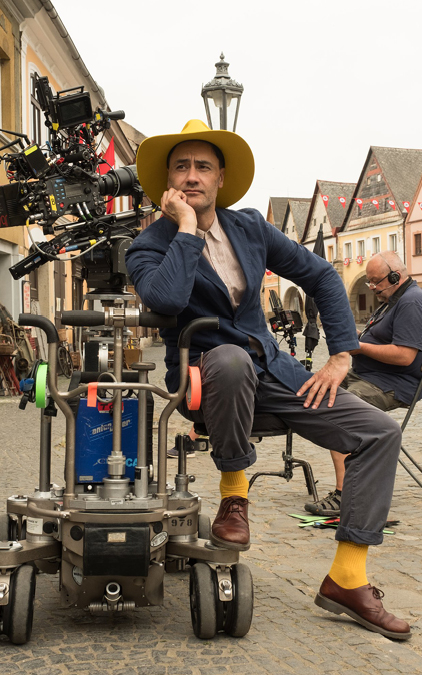Taika Waititi

New Zealand filmmaker and actor Taika Waititi has moved from indie comedies (What We Do in the Shadows, Hunt for the Wilderpeople) to big-budget superhero movies (Thor: Ragnarok) to prestige award fodder with his latest film, Jojo Rabbit, which is nominated for six Academy Awards, including Best Picture. Based on the novel Caging Skies by Christine Leunens, Jojo Rabbit follows the title character (Roman Griffin Davis), a 10-year-old boy in Nazi Germany toward the end of World War II, who sees Adolf Hitler (played by Waititi himself) as his imaginary best friend, and comes to doubt his allegiance to the Nazis when he discovers that his mother (Scarlett Johansson) has been hiding a Jewish girl (Thomasin McKenzie) in the family attic. Even though we’re sure he wanted to, Waititi wasn’t available to talk to DAVID Magazine, so we put together a chat from the many other interviews he’s given about the movie.
Why did you decide on a much more humorous adaptation of the book?
The book has a darker tone. Knowing myself and knowing the stories I tell, I decided that I had to put more of that stuff in. More of that humor – the imaginary Hitler and all that stuff – because otherwise I just wouldn’t have felt comfortable doing a drama. Drama, literally, is just saying words convincingly and trying not to make an audience laugh. Trying to make an audience laugh is infinitely harder, and trying make an audience laugh and cry is doubling down on how hard your task is. (IndieWire, December 23, 2019)
Did you want this movie to be chilling?
Yeah. I mean, I didn’t want to make some crappy saccharine film, something that just was set in World War II and just had jokes at the expense of the experiences of millions of people. You have a big responsibility when you come to making a film set in that time. I feel like if people don’t get the point of using humor to dismantle these regimes built on intolerance and hate, I’m wasting my time with the person I’m explaining it to. (NPR’s Morning Edition, October 18, 2019)
How did the studio pitch you on playing Adolf Hitler yourself?
They made a good point which was that particular role is written a certain way and it needs to be handled by the person who invented that character. Part of it is the celebrity distraction thing, but also because the way I wrote it, and because I knew how it needed to be played, it fell on me. And it actually made it easier to play because I didn’t have to deal with someone else filtering what I was trying to do. They were right, looking back on it. If I worked with another actor, maybe that person would have researched it too much or tried to do a more authentic version of Hitler and pulled away [from] the buffoonery I was after. (Business Insider, October 14, 2019)
How did it feel to play Hitler?
It just felt uncomfortable. The clothes were uncomfortable, the glue-on mustache was uncomfortable, and I had to have my hair dyed and straightened, which just made me feel weird all day long. I like to be everyone’s friend as a director, to have a nice familial feel on set, and I’m trying to encourage sharing of ideas and a cool, creative space … but I’m dressed like Hitler. It just changes things, really. I would take off the mustache whenever I wasn’t in the scene, and I’d wear a hat, and always take off the jacket because you don’t want to be walking around with a f**king swastika on your arm trying to direct kids. (The Guardian, December 26. 2019)
Were you worried about taking the comedy too far?
I was never worried, because I feel like this film follows in the footsteps of some really great anti-war satires and other comedies that use humor as a device to carry a deeper message, and usually those work best when they’re about war or politics. So I wasn’t really worried about that. My main concern was that I had the tonal balance right. That always comes in the edit. We test the films a lot: “How does it feel? Is it too dramatic over here, is it too comedic here?” It is a fine balancing act. (Yahoo Movies UK, December 30, 2019)
Do you think kids should see this movie?
Yeah, I think they should. I’d say 11 or 12 is probably the sweet spot. Roman was 10 when he shot the film and he was very aware of the story. He’s a very sensitive kid and very informed with very smart parents who made sure he learned as much as he could about the period and about what was going on. I would say that this is the perfect film for a 10-year-old to learn about the atrocities of World War II. (Complex, October 23, 2019)
Jojo Rabbit is available for digital download February 4.
